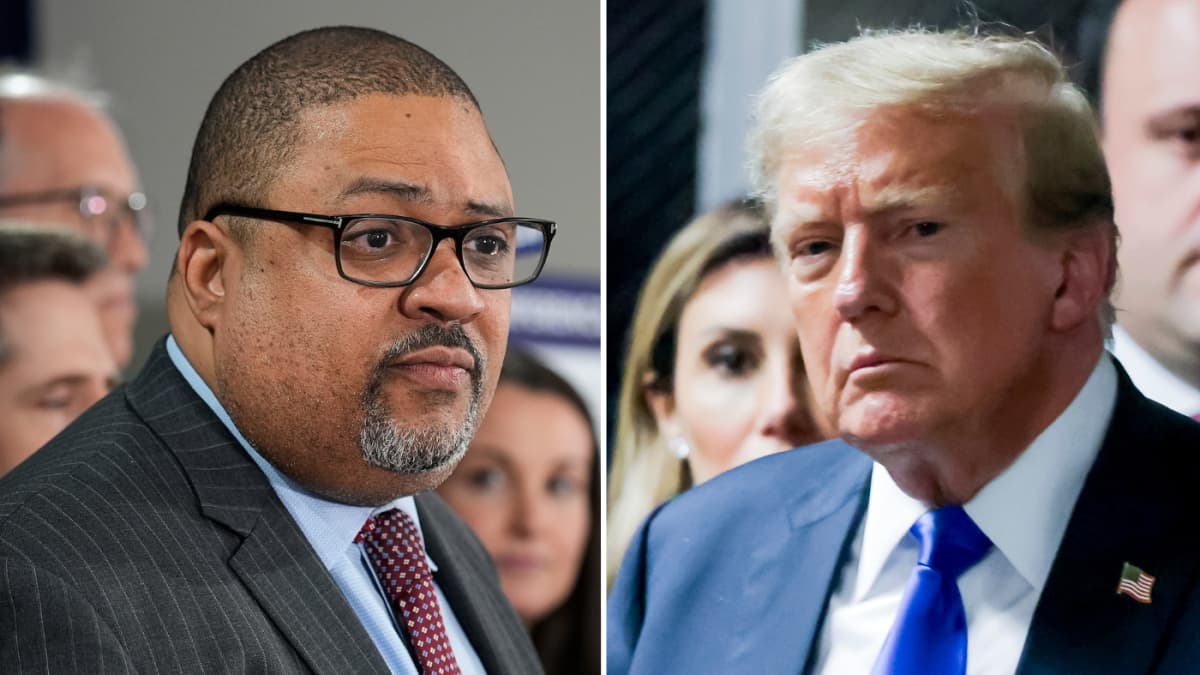Trump Makes His Case To Undo Felon Status: Alvin Bragg’s Prosecution ‘Should Never Have Seen the Inside of a Courtroom’
The brief contends that the case is the ‘most politically charged prosecution in our Nation’s history.’

President Trump’s filing of a 111-page brief arguing that his hush money convictions were “fatally marred” and ought to be overturned is a landmark in his effort to undo his status as a convicted felon.
The brief is docketed at the New York Supreme Court, Appellate Division, First Department. That is the Empire State’s intermediate appellate tribunal. Mr. Trump was convicted on 34 counts by a Manhattan jury at a trial presided over by Judge Juan Merchan.
The 47th president is being represented on appeal by the law firm of Sullivan & Cromwell. Their task is to convince the jurists of the First Department to toss those “guilty” verdicts, which stem from payments Mr. Trump made to adult film star Stormy Daniels, whose real name is Stephanie Clifford. Ms. Clifford claims those checks were intended to cover up a long-ago sexual encounter.
District Attorney Alvin Bragg argued that those payments violated New York’s statute against falsification of business records. Such falsifications are usually punished as misdemeanors, but Mr. Bragg contended that since they were transacted in the service of an unspecified second crime they amounted to felonies. Judge Merchan ruled that such a prosecutorial approach was valid and that jurors need not agree on the second crime to convict.
Now Mr. Trump’s team argues that “this is the most politically charged prosecution in our Nation’s history. After years of fruitless investigation into decade-old, baseless allegations— and under immense political pressure to criminally charge President Donald J. Trump for something — New York’s district attorney manufactured felony charges against a once-former and now-sitting President of the United States.”
The allusion is to the decision by Mr. Bragg’s predecessor, District Attorney Cyrus Vance Jr., not to prosecute this case. The Department of Justice also passed on prosecuting Mr. Trump for the payments, even as it pursued charges against his erstwhile attorney, Michael Cohen, who was the middleman for the financial arrangement with Ms. Clifford.
Mr. Trump argues that Mr. Bragg’s charges “were as unprecedented as their political context. Targeting alleged conduct that has never been found to violate any New York law, the DA concocted a purported felony … This case should never have seen the inside of a courtroom, let alone resulted in a conviction.”
The 47th president makes a multi-pronged case for reversal. He argues that the “trial was fatally marred by the introduction of official Presidential acts that the Supreme Court has made clear cannot be used as evidence against a President. The jury was instructed incorrectly, allowing a conviction without the unanimity required by both New York law and basic due process. Beyond these fatal flaws, the evidence was clearly insufficient to convict.”
Mr. Trump has argued before, without success, that the Supreme Court’s ruling in Trump v. United States that official presidential acts are presumptively immune from prosecution demands that his convictions be overturned. Judge Merchan ruled against him on that issue, finding that the actions at issue here were private and unofficial in nature. Presidential immunity is a federal issue, which means the Supreme Court could eventually hear an appeal.
The Nine have already declined to intervene in this case once before, when Mr. Trump filed an emergency petition for the high court to block his sentencing in the days before he swore the oath for a second time. Chief Justice Roberts and Justice Amy Coney Barrett demurred, and Judge Merchan sentenced Mr. Trump to an “unconditional discharge,” meaning no further punishment was imposed. The underlying convictions, though, abide.
Mr. Trump and Judge Merchan have long locked horns. Now, the appellate brief contends that the “trial was conducted by a judge who refused to recuse himself despite having made political contributions to President Trump’s electoral opponents and despite having disqualifying family conflicts.” Judge Merchan donated some $35 to Democratic causes around the 2020 elections, and his adult daughter, Loren, works at a consulting firm that counted Vice President Harris as a client.
Mr. Trump’s strongest argument could center on how Judge Merchan instructed the jury. The president’s lawyers contend that “the trial court erred in instructing the jury that it could convict President Trump of having conspired to ‘promote or prevent the election of any person to a public office by unlawful means’ without unanimously agreeing on what those ‘unlawful means’ actually were.”
Judge Merchan reasoned that the requirement that a jury convict with unanimity was not violated by the possibility that the jurors did not concur on the nature of the second crime, which could have been, say, campaign finance violations, tax fraud, or further false statements. Mr. Trump argues that “Due process … does not permit a conviction based on such a haphazard ‘combination of jury findings.’”
Mr. Trump has enjoyed success before the First Department. In August, the court overturned the $500 million civil fraud verdict secured by Attorney General Letitia James against the president, his two adult sons, and their family business. The appellate judges ruled the immensity of that penalty violated the constitutional prohibition on “excessive fines.”

